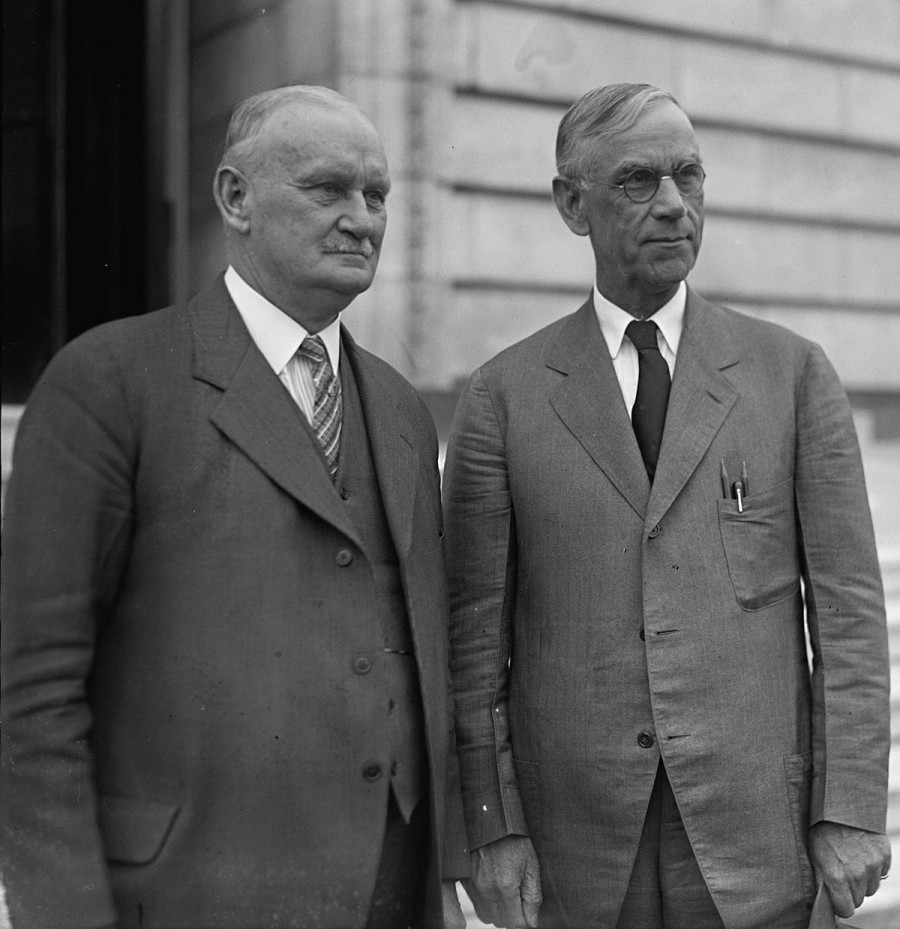Later President Theodore “Teddy” Roosevelt broke up a number of large monopoly industries and trusts, while substantially reducing tariffs, which were a large source of federal tax revenue at the time, and in part setting the stage for the creation and implementation of the federal income tax in 1913.
Post World War I, the costs of the great war, in lives and government treasuries, caused many nations of the world to consider nationalist and protectionist policies, in part to isolate themselves in the event of another future global conflict. The United States was among those countries considering such an internal facing economic turn.
The League of Nations, a precursor to the United Nations, was formed in 1920 in Paris and headquartered in Geneva, Switzerland to promote world peace. President Woodrow Wilson was a primary advocate for the creation of the League, to maintain peace, though the U.S. never became a member.
Wilson was a Democrat and the Republican Party of that day opposed the growing trend of free trade as well as the League of Nations. Thanks in part to the Industrial Revolution, the U.S. had a strong trade surplus, while there were beliefs that foreign trade was stealing American jobs as the country headed into a recession in 1929.
In October of 1929, the stock market crashed, rippling across global finance markets. U.S. Senator Reed Smoot, a Morman 'prophet,' businessman and Chair of the Senate Finance Committee, proposed a series of high tariffs and duties on a list of 20,000 durable goods being imported into the United States.
Working with House Ways and Means Chairman, Congressman Willis Hawley, the pair crafted the Smoot-Hawley Tariffs Act of 1930. which went into effect in June of that year. Duties on some popular imports were quadrupled. As the bill headed to President Herbert Hoover's desk for signature, nearly 1000 of the nation's leading economists wrote a letter asking the President not to sign or veto the bill.
Though Hoover had previously been critical of the bill and tariffs in general, he signed the bill into law, beginning in effect a global trade war. An outraged Canada placed a tariff of roughly 30 percent on American imports. The UK, France and Germany immediately followed suit, either developing their own internal manufacturing capacity to replace American imports, or locating alternative markets.
Global trade dried up, much of the world's shipping fleet was mothballed, and new ship orders were cancelled. This in turn affected numerous other U.S. profit centers and industries including steel production, fishing, farming and manufacturing of all kinds. Along with the market crash and present recession, the U.S. economy slid into the Great Depression.
Incoming President Franklin Delano Roosevelt faced economic meltdown and catastrophe. Speaking of the Smoot-Hawley Tariff Act, he said that the U.S. had "...compelled the world to build tariff fences so high that world trade is decreasing to a vanishing point."
From 1929 to 1933, U.S. exports plummeted by 61 percent, imports declined by 66 percent. The unemployment rate tripled from 8 percent to 25 percent. America's aggregate wealth was nearly cut in half.
Though the negative impacts of the tariff hikes across allies and enemies alike were almost immediate, repairing this damage would take decades, both in terms of statecraft and rebuilding trust and U.S. trade markets. Until the U.S. joined the Allies in fighting World War II., when France was occupied by German forces and London was being continually shelled, the U.S. had alienated itself from much of the rest of the world.
While I do not believe that the more immediate and ever changing Trump Administration tariffs, duties and taxes will have as immediate or drastic an impact, if the deal maker-in-chief cannot produce results quickly, the tariffs will become a net drag on the U.S. economy and consumer spending. And U.S. exports markets will shrink.
Time and again in our nation we have been able to find the best path ahead in part by looking at what did not work well in our past. The data is still there...this point is not yet s'moot.

http://accesswdun.com/article/2025/4/1290308/trade-wars
